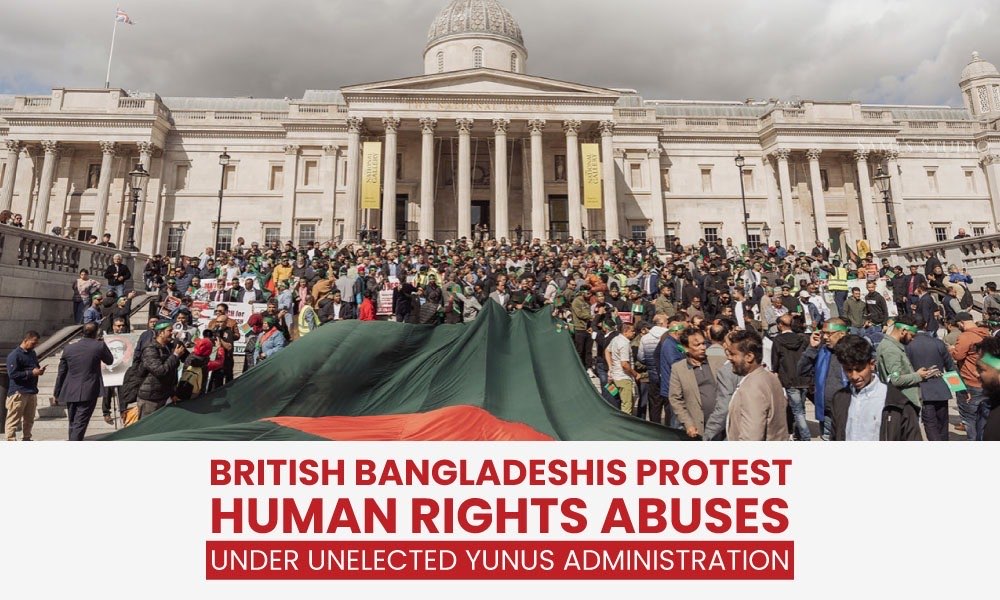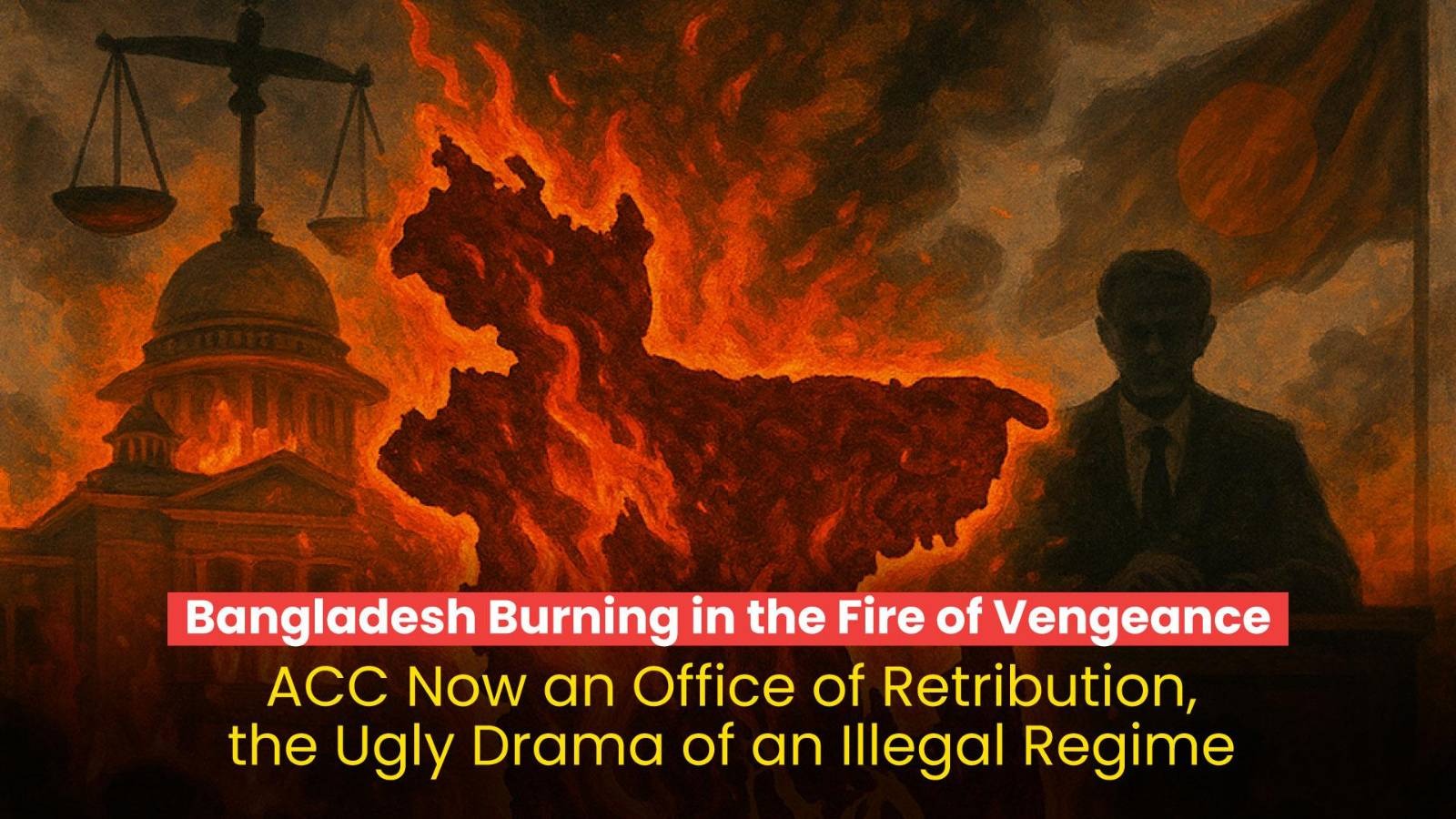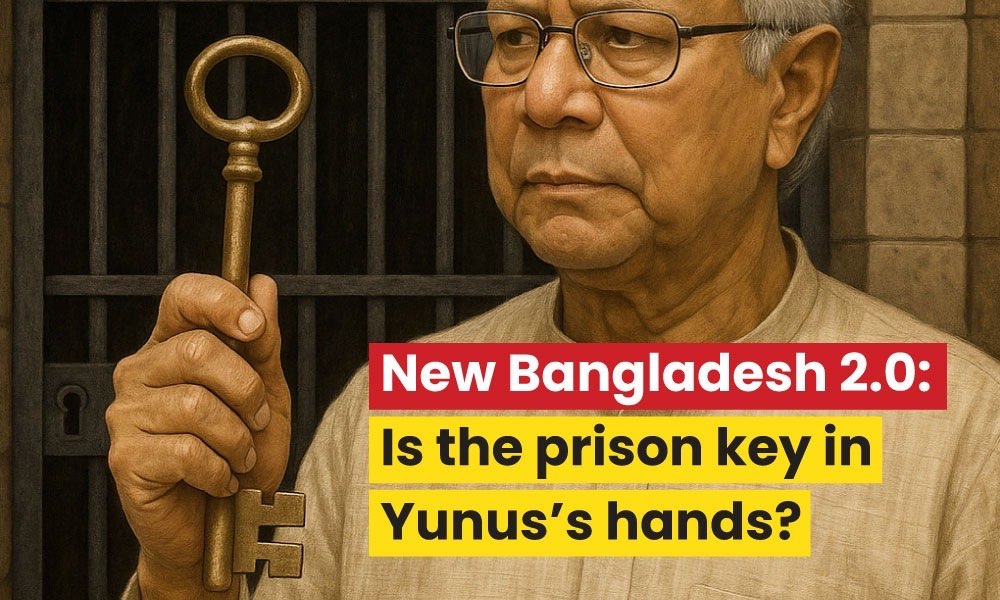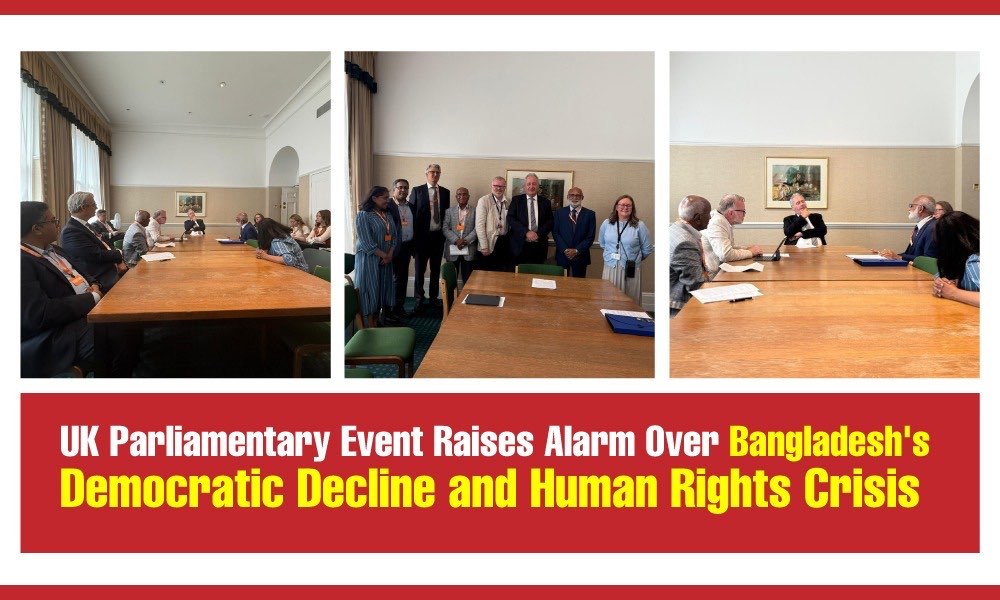501
Published on September 23, 2025The Yunus-led interim government has seized the state, weaponizing courts, police, and local administrations to enforce a campaign of vengeance. Streets, villages, and political offices have become hunting grounds for anyone linked to the Awami League. Almost 15 to 20 million Awami League leaders and activists are now internally displaced, driven from their homes, offices, and communities.
20 million Awami League Leaders and Activists Displaced
This is not chaos; it is calculated, relentless, and systematic. Arbitrary arrests, fabricated charges, and constant intimidation have turned institutions meant to protect citizens into instruments of terror. Democracy is suffocating, dissent is criminalized, and the Constitution itself is trampled under the guise of “neutrality.”
Every displaced leader, silenced activist, and shuttered office is proof: the regime is determined to erase Bangladesh’s largest political party and its grassroots entirely.
Unchecked Violence and Mass Displacement: The Human Cost
Now, if the 15 to 20 million figure of displaced Awami League leaders and activists seems staggering, that’s because it is, a number so vast it eclipses any previous episode of political persecution in South Asia’s modern history. What Bangladesh is witnessing today under the Yunus-led interim government is not a mere power shift. It is the systematic dismantling of an entire political party and the forced uprooting of millions who once formed the beating heart of the Awami League’s grassroots.
When Political Revenge Becomes Policy: The Worst Human Rights Crisis in Recent Memory
When Sheikh Hasina’s government fell on August 5, 2024, many hoped for a calm transition, perhaps even an era of political reconciliation. Instead, what followed was a state-sponsored vendetta. Within days, Awami League offices across the country were attacked, party members were harassed, and homes of known activists were set ablaze. The persecution that began as isolated acts of revenge quickly morphed into a nationwide campaign of intimidation, imprisonment, and exile.
Attacks on Homes and Properties of Awami League Leaders
The regime’s playbook is clear: erase the Awami League from public life by destroying its roots. It began with an overwhelming wave of arrests and lawsuits. Thousands of party members were rounded up, often without warrants, and thrown into detention on charges that ranged from “sabotage” to “conspiracy.” Local police stations became detention hubs; the judiciary, instead of serving as a bulwark of justice, turned into an administrative tool for repression. Bail was routinely denied, hearings deliberately delayed, and legal representation often blocked.
False Cases Against Awami League Activists
The strategy was as cruel as it was effective. By weaponizing the legal system and empowering mobs, the interim administration ensured that Awami League members could not find safety, not in their homes, not in the courts, and not in the streets.
Mob Violence and Administrative Collusion
Much of the displacement stems from a deadly alliance between political opportunists and elements of the state. BNP-Jamaat cadres, emboldened by the interim government’s silence, have carried out violent attacks on Awami League supporters. In dozens of districts, their homes were burned, their families threatened, and their communities torn apart. Eyewitnesses describe how local administration officials and police stood by, or worse, participated in the intimidation.
This is not random chaos; it is coordinated terror. Entire neighborhoods were marked as “Awami strongholds” and systematically targeted. Those who could flee did so overnight, leaving behind everything: homes, businesses, farms, schools. Those who couldn’t were arrested or forced into hiding. “For the safety of our families and ourselves, we had no choice but to leave,” said one displaced local leader from Mymensingh. “We are now deprived of even the basic rights guaranteed by the Constitution.”
Awami League Leaders Forced to Pay to Return Home, Facing Continuous Attacks
In many rural areas, BNP-Jamaat mobs were given free rein, torching entire villages suspected of harboring Awami League supporters. In cities, administrative orders authorized sudden raids, sweeping up hundreds at a time in the name of “law enforcement.” It is this combination of mob terror and administrative cruelty that has fueled the largest internal displacement of political activists in Bangladesh’s history.
Life in Hiding: From Political Leaders to Day Laborers
For those forced to flee, displacement has meant losing not only their homes but their identities. Senior Awami League members now live in disguise; former ward leaders pull rickshaws in the cities; union organizers work as day laborers in remote districts under false names. Entire families have been torn apart.
Many who once commanded respect and authority in their communities now live hand-to-mouth, stripped of dignity and protection. Some have been living in makeshift shelters, too afraid to contact their families, knowing that any phone call could lead the police or vigilantes to their hideouts. “Even speaking to my wife is a risk,” said another displaced activist. “Every familiar voice could be a trap.”
And yet, the spirit of resistance endures. Despite the terror, displaced leaders continue to secretly coordinate organizational activities. Some travel to Dhaka under the cover of night to attend underground meetings; others manage local operations through trusted networks. Their resilience is a quiet act of defiance against a regime determined to erase them.
A Strategy of Political Cleansing
This campaign of repression serves two purposes: physical removal and political erasure. The physical displacement of Awami League members weakens their local networks, dismantles their influence, and isolates them from their constituencies. But more insidiously, it also seeks to erase their political identity, to make the Awami League irrelevant in the national conversation.
By criminalizing its members, silencing its leadership, and scattering its base, the interim government has engineered a situation where fear replaces organization and silence replaces activism. Each day that passes without Awami League activity is a day closer to the government’s goal of total political control.
This is not democracy under stress; it is democracy under siege. When millions are forced to abandon their homes for their political beliefs, the line between governance and tyranny disappears entirely.
Weaponizing the Judiciary
The judiciary has become the central pillar of this repression. What should have been an independent guardian of justice has instead been converted into a political weapon. Courts have denied bail en masse, refused to hear appeals, and in many cases, issued blanket remand orders without evidence. Judges sympathetic to the Awami League have been transferred or silenced, while new appointees, loyal to the interim administration, execute political orders under the guise of legal authority.
This manipulation of justice doesn’t just punish individuals; it sends a message: to support the Awami League is to risk your freedom, your livelihood, and your family’s safety. With every arrest warrant, the government tightens its grip; with every delayed hearing, it buys time to consolidate power.
The Human Rights Dimension
The crisis has now drawn international concern. Rights organizations have begun documenting cases of extrajudicial detention, forced displacement, and politically motivated killings. According to Awami League sources, hundreds of thousands have been arrested or assaulted since the interim government took power, while millions more remain displaced and stateless within their own country.
For many, this is not just a political crisis; it is a humanitarian catastrophe. Children have been pulled out of schools, families live in fear of raids, and communities that once celebrated political diversity now live under a blanket of fear. The United Nations Declaration of Human Rights, which guarantees freedom of association and political participation, has been rendered meaningless on Bangladeshi soil.
A Nation Under Fear
Walk through the once-vibrant neighborhoods of Dhaka, Khulna, or Rajshahi, and you will find streets emptied of familiar faces. Homes that once displayed the red-green party flag now stand abandoned or burned. Small business owners whisper about their vanished neighbors. Rural mosques and tea stalls, once alive with political debate, now echo with silence.
This silence is not peace; it is fear. It is the sound of a nation being stripped of its democratic soul. Every displaced activist, every silenced voice, every courtroom farce contributes to a single goal: the erasure of Bangladesh’s largest political movement from the national memory.
The displacement of 15 to 20 million Awami League leaders and activists is not a statistic; it is the story of a nation under siege. It is a crisis born from deliberate intent, fueled by vengeance, and executed through state power. The Yunus-led interim government may claim neutrality, but neutrality does not look like burned homes, mass arrests, and exiled citizens.
The world cannot look away. For as long as millions remain displaced and silenced, Bangladesh’s democracy will not recover; it will only remember.”
This kind of ending gives readers a sense of closure and responsibility.
The Yunus-led interim government has seized the state, weaponizing courts, police, and local administrations to enforce a campaign of vengeance. Streets, villages, and political offices have become hunting grounds for anyone linked to the Awami League. Almost 15 to 20 million Awami League leaders and activists are now internally displaced, driven from their homes, offices, and communities.
20 million Awami League Leaders and Activists Displaced
This is not chaos; it is calculated, relentless, and systematic. Arbitrary arrests, fabricated charges, and constant intimidation have turned institutions meant to protect citizens into instruments of terror. Democracy is suffocating, dissent is criminalized, and the Constitution itself is trampled under the guise of “neutrality.”
Every displaced leader, silenced activist, and shuttered office is proof: the regime is determined to erase Bangladesh’s largest political party and its grassroots entirely.
Unchecked Violence and Mass Displacement: The Human Cost
Now, if the 15 to 20 million figure of displaced Awami League leaders and activists seems staggering, that’s because it is, a number so vast it eclipses any previous episode of political persecution in South Asia’s modern history. What Bangladesh is witnessing today under the Yunus-led interim government is not a mere power shift. It is the systematic dismantling of an entire political party and the forced uprooting of millions who once formed the beating heart of the Awami League’s grassroots.
When Political Revenge Becomes Policy: The Worst Human Rights Crisis in Recent Memory
When Sheikh Hasina’s government fell on August 5, 2024, many hoped for a calm transition, perhaps even an era of political reconciliation. Instead, what followed was a state-sponsored vendetta. Within days, Awami League offices across the country were attacked, party members were harassed, and homes of known activists were set ablaze. The persecution that began as isolated acts of revenge quickly morphed into a nationwide campaign of intimidation, imprisonment, and exile.
Attacks on Homes and Properties of Awami League Leaders
The regime’s playbook is clear: erase the Awami League from public life by destroying its roots. It began with an overwhelming wave of arrests and lawsuits. Thousands of party members were rounded up, often without warrants, and thrown into detention on charges that ranged from “sabotage” to “conspiracy.” Local police stations became detention hubs; the judiciary, instead of serving as a bulwark of justice, turned into an administrative tool for repression. Bail was routinely denied, hearings deliberately delayed, and legal representation often blocked.
False Cases Against Awami League Activists
The strategy was as cruel as it was effective. By weaponizing the legal system and empowering mobs, the interim administration ensured that Awami League members could not find safety, not in their homes, not in the courts, and not in the streets.
Mob Violence and Administrative Collusion
Much of the displacement stems from a deadly alliance between political opportunists and elements of the state. BNP-Jamaat cadres, emboldened by the interim government’s silence, have carried out violent attacks on Awami League supporters. In dozens of districts, their homes were burned, their families threatened, and their communities torn apart. Eyewitnesses describe how local administration officials and police stood by, or worse, participated in the intimidation.
This is not random chaos; it is coordinated terror. Entire neighborhoods were marked as “Awami strongholds” and systematically targeted. Those who could flee did so overnight, leaving behind everything: homes, businesses, farms, schools. Those who couldn’t were arrested or forced into hiding. “For the safety of our families and ourselves, we had no choice but to leave,” said one displaced local leader from Mymensingh. “We are now deprived of even the basic rights guaranteed by the Constitution.”
Awami League Leaders Forced to Pay to Return Home, Facing Continuous Attacks
In many rural areas, BNP-Jamaat mobs were given free rein, torching entire villages suspected of harboring Awami League supporters. In cities, administrative orders authorized sudden raids, sweeping up hundreds at a time in the name of “law enforcement.” It is this combination of mob terror and administrative cruelty that has fueled the largest internal displacement of political activists in Bangladesh’s history.
Life in Hiding: From Political Leaders to Day Laborers
For those forced to flee, displacement has meant losing not only their homes but their identities. Senior Awami League members now live in disguise; former ward leaders pull rickshaws in the cities; union organizers work as day laborers in remote districts under false names. Entire families have been torn apart.
Many who once commanded respect and authority in their communities now live hand-to-mouth, stripped of dignity and protection. Some have been living in makeshift shelters, too afraid to contact their families, knowing that any phone call could lead the police or vigilantes to their hideouts. “Even speaking to my wife is a risk,” said another displaced activist. “Every familiar voice could be a trap.”
And yet, the spirit of resistance endures. Despite the terror, displaced leaders continue to secretly coordinate organizational activities. Some travel to Dhaka under the cover of night to attend underground meetings; others manage local operations through trusted networks. Their resilience is a quiet act of defiance against a regime determined to erase them.
A Strategy of Political Cleansing
This campaign of repression serves two purposes: physical removal and political erasure. The physical displacement of Awami League members weakens their local networks, dismantles their influence, and isolates them from their constituencies. But more insidiously, it also seeks to erase their political identity, to make the Awami League irrelevant in the national conversation.
By criminalizing its members, silencing its leadership, and scattering its base, the interim government has engineered a situation where fear replaces organization and silence replaces activism. Each day that passes without Awami League activity is a day closer to the government’s goal of total political control.
This is not democracy under stress; it is democracy under siege. When millions are forced to abandon their homes for their political beliefs, the line between governance and tyranny disappears entirely.
Weaponizing the Judiciary
The judiciary has become the central pillar of this repression. What should have been an independent guardian of justice has instead been converted into a political weapon. Courts have denied bail en masse, refused to hear appeals, and in many cases, issued blanket remand orders without evidence. Judges sympathetic to the Awami League have been transferred or silenced, while new appointees, loyal to the interim administration, execute political orders under the guise of legal authority.
This manipulation of justice doesn’t just punish individuals; it sends a message: to support the Awami League is to risk your freedom, your livelihood, and your family’s safety. With every arrest warrant, the government tightens its grip; with every delayed hearing, it buys time to consolidate power.
The Human Rights Dimension
The crisis has now drawn international concern. Rights organizations have begun documenting cases of extrajudicial detention, forced displacement, and politically motivated killings. According to Awami League sources, hundreds of thousands have been arrested or assaulted since the interim government took power, while millions more remain displaced and stateless within their own country.
For many, this is not just a political crisis; it is a humanitarian catastrophe. Children have been pulled out of schools, families live in fear of raids, and communities that once celebrated political diversity now live under a blanket of fear. The United Nations Declaration of Human Rights, which guarantees freedom of association and political participation, has been rendered meaningless on Bangladeshi soil.
A Nation Under Fear
Walk through the once-vibrant neighborhoods of Dhaka, Khulna, or Rajshahi, and you will find streets emptied of familiar faces. Homes that once displayed the red-green party flag now stand abandoned or burned. Small business owners whisper about their vanished neighbors. Rural mosques and tea stalls, once alive with political debate, now echo with silence.
This silence is not peace; it is fear. It is the sound of a nation being stripped of its democratic soul. Every displaced activist, every silenced voice, every courtroom farce contributes to a single goal: the erasure of Bangladesh’s largest political movement from the national memory.
The displacement of 15 to 20 million Awami League leaders and activists is not a statistic; it is the story of a nation under siege. It is a crisis born from deliberate intent, fueled by vengeance, and executed through state power. The Yunus-led interim government may claim neutrality, but neutrality does not look like burned homes, mass arrests, and exiled citizens.
The world cannot look away. For as long as millions remain displaced and silenced, Bangladesh’s democracy will not recover; it will only remember.”
This kind of ending gives readers a sense of closure and responsibility.














